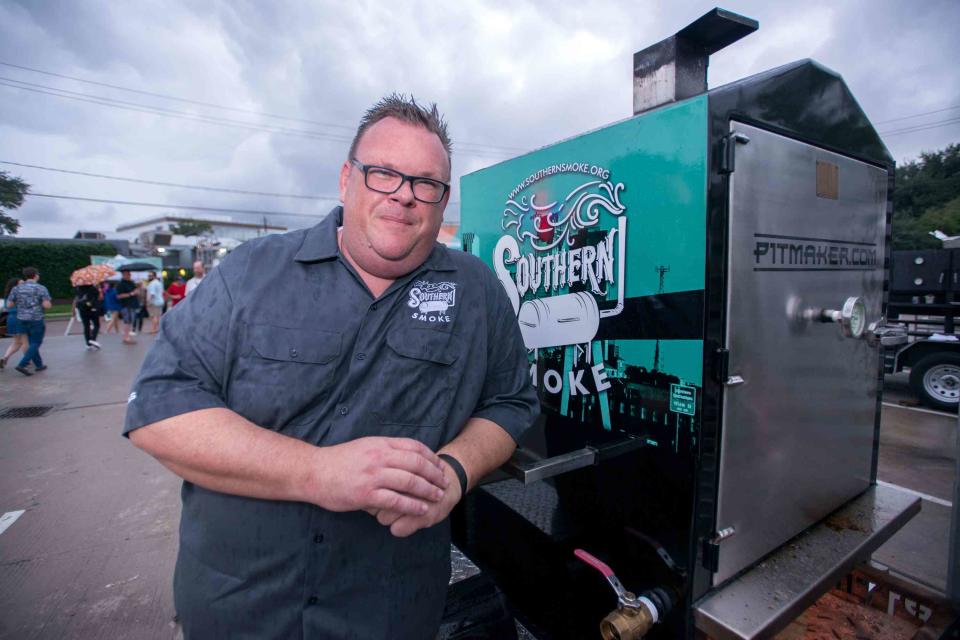How to Get Free Mental Health Care If You Work in the Hospitality Industry
The Southern Smoke Foundation offers mental health support resources for the people who feed us. Here's how to get help.

Back in 2016 when I first started writing and speaking publicly about the mental health crisis in the hospitality industry, I was never sure if I was going to be met with a hug or a punch. I knew from personal experience that talking about mental health in public was borderline taboo, but in the restaurant community, it was something akin to sacrilege. You muscle through, you work hurt, you burn your body and soul to ash serving others, but there's only virtue in starving yourself of any care or comfort — and god forbid you ever talk about it or seek help.
But that's not sustainable, not long term. People got tired of seeing their colleagues and friends burn out, break down, and worse. In the years since — most notably after Anthony Bourdain's suicide in 2018 — chefs, servers, bartenders, and other restaurant workers have come forward with extraordinary courage to share their own struggles, offer solidarity, and in the case of Southern Smoke, create practical and immediate resources and support for hospitality workers in crisis.
:Restaurant Workers Don't Have Safety Nets, So This Chef Created One
In 2015, Houston chef and restaurateur Chris Shepherd learned that a friend and former colleague, sommelier Antonio Gianola, had been diagnosed with multiple sclerosis. Shepherd gathered some chef and pitmaster pals together to throw an epic party, from which they collectively raised $181,000 for the MS Society. Over the next few years, the scope and goals of the annual event grew, and when Hurricane Harvey wreaked havoc upon the region and its hospitality workers, the mission of the Southern Smoke Festival and its namesake foundation swiftly changed. Since 2017, all food or beverage workers in the United States have been eligible to apply for emergency grants to cover lost wages, rent, repairs due to natural disasters, groceries, medication, mental health care, and other expenses, all funded by the festival, merchandise, auctions, and donations.
"We should be talking about mental health. It shouldn't be taboo," Shepherd told Food & Wine's editor in chief, Hunter Lewis. "Whether it's financial aid, putting food on the table, or helping someone find a mental health professional to talk to, we're there as a helping hand."
:When Luxury Is Stripped Away, What's Left Is Humanity
In 2020, Southern Smoke partnered with Mental Health America of Greater Houston and the University of Houston to further grow the free mental health services to food and beverage workers throughout Texas. Texas is notoriously big, but as Shepherd, co-founding-director Lindsay Brown, and the members of their board realized, the barriers to affordable mental healthcare are massive — especially for a workforce that is largely underpaid and without insurance. In October 2022, the program expanded its partnerships to include clinicians at universities in California, Louisiana, and Illinois, to provide no-cost mental health sessions. Workers from outside of those states can request emergency funds for counseling.
According to Brown, 172 people have received mental health services through the program, each averaging 20 sessions each, with services provided in English and Spanish at all facilities, as well as via telehealth. The Foundation's board pledges to grow the program by partnering with institutes of higher learning across all 50 states and as Brown notes, "Just because you don't live in one of these states doesn't mean we can't help you."
:The Food & Wine Pro Guide to Mental Health and Sobriety Resources
The mental health crisis in this industry we all hold so dear has been smoldering under the surface for decades. No single person or organization is going to solve it, but with each person who feels empowered to speak up and seek help, hope, and community a change is sparked. Southern Smoke will be there to light the way forward.
To get started, go to the Southern Smoke website. If you are a food and beverage worker who lives in California, Illinois, Louisiana, or Texas, fill out this contact form and someone will be in touch to set up a referral. If you do not live in one of those states, you are still eligible to apply for emergency funds to receive mental health services where you live, using this form.
If you or someone you know is struggling or in crisis, do not wait. Help is available 24/7. Call or text 988 or chat 988lifeline.org, the 988 Suicide and Crisis Lifeline.
false

